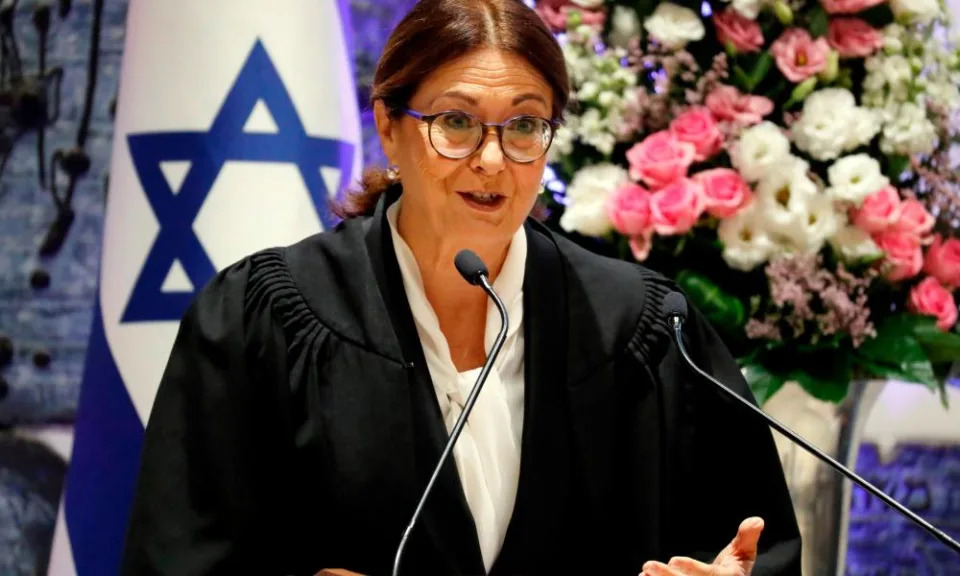Bethan McKernan in Jerusalem
Sat, 23 September 2023

Photograph: Thomas Coex/AFP/Getty Images
When Esther Hayut, a bespectacled woman with hair always neatly parted down the middle and pinned back with a barrette, was sworn in as the chief justice of Israel’s supreme court in 2017, she pledged to protect the country’s judiciary from politically motivated attempts to weaken it.
“It is the properly applied rule of law that serves as the glue which keeps our nation together … I pray that the justice system will not crack,” she told an audience that included Israel’s prime minister, Benjamin Netanyahu.
The child of Holocaust survivors, and something of a pop star in her youth, Hayut and the attorney general, Gali Baharav-Miara , are perhaps unlikely candidates for the faces of liberal Israel. But eight months into the existential crisis triggered by the Israeli government’s judicial overhaul, that is how they are viewed by supporters and detractors alike.
“I see Hayut as courageous. She knows this is not an ordinary situation and is willing to speak out,” said a former Israeli justice minister who asked to be quoted anonymously in order to speak freely. “She shares the values that defined Israel until now.”
Hayut’s term has dovetailed with mounting attacks on the judicial system. Netanyahu, who faces corruption charges he denies, led the charge. But the campaign accelerated at the instigation of the prime minister’s coalition partners: since last year’s election, his far-right allies have made judicial overhaul their raison d’être.
The government says that the changes are needed to rein in an unelected and biased supreme court. The huge protest movement opposed to the plans says the proposals amount to democratic backsliding.
So far, only one element of the overhaul has been passed into law: the abolition of the “reasonableness clause” that allows the supreme court to override government decisions. The court last week began hearing petitions against scrapping the clause, meaning top judges are now in the extraordinary position of deciding on whether to limit their own powers.
Related: Protests in Israel as supreme court hears challenge to judicial curbs
Hayut’s legacy is on the line ahead of mandatory retirement when she turns 70 next month. The final rulings of supreme court justices are usually weighty, but there has never been more at stake in Israel’s roiling body politic.
Hayut was born in 1953 in a ma’abara, or transit camp for immigrants, in the town of Herzliya. Her parents were Romanians: her mother survived deportation to Transnistria, and her father Auschwitz. They divorced while Hayut was still a toddler. An only child, she was raised by her maternal grandparents.
At 18, during her military service, she became semi-famous as a singer in a band attached to the Israel Defense Forces’ Central Command. In the 1960s and 70s, the army’s musical outfits were popular, serving as a training ground for young people who would go on to become famous musicians and performers, including pop star Dorit Reuveni.
Musicians from the time remember Hayut as charming, disciplined and smart. The group are still friends. “Even then she wanted to be a lawyer and aspired to be a judge,” Reuveni told news website Ynet in 2017. Hayut graduated in law from Tel Aviv University, opened her own practice and by 1990 had become a judge, rising to the supreme court in 2004. The presidency is decided by seniority; in 2017 she was sworn in for a five-year term.
Considered part of the bench’s liberal camp, according to the New York online Tablet magazine, Hayut has “made a career out of walking a fine line … championing the underprivileged but committed to national security”.
She is sympathetic to class actions against large companies and discrimination cases, and strengthened protection laws for foreign workers. In decisions, she often quotes poetry. Yet Palestinians would not agree with the chief justice’s image as progressive: she decided in 2014 that house demolitions of Palestinians who commit terror attacks are justified, although under international law this is considered collective punishment.
Some of Hayut’s landmark rulings have struck down government laws, for which she has been criticised by the right. Hayut was part of the majority opinion invalidating the Tal Law, temporary legislation exempting ultra-Orthodox yeshiva students from military service, and cancelled privatisation plans for prisons. In some cases she approved the appointment of ministers with criminal records, in others struck them down.
For the hearings on the “reasonableness” clause, Hayut convened a panel of all 15 judges – the first time the entire bench has been called. Observers believe she is keen to show that the court’s decision will be as broad as possible.
This month’s marathon 13-hour opening session was watched closely for clues about how the justices will lean, but Hayut’s opinion appears to be clear. In a fiery and unprecedented address in January, she declared that the judicial overhaul “would fatally undermine judicial independence, giving the Knesset a ‘blank cheque’ to pass any legislation it pleases, even in violation of basic civil rights”.
Addressing the government’s legal representatives, Hayut said: “You think the duty to act reasonably applies to the government and ministers … But who makes sure they do?”
Israel’s supreme court has never struck down a quasi-constitutional “basic law” before. What is likely to be Hayut’s final ruling could also plunge the country into uncharted political and legal waters.
No comments:
Post a Comment